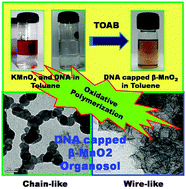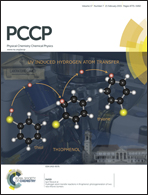DNA-encapsulated chain and wire-like β-MnO2 organosol for oxidative polymerization of pyrrole to polypyrrole
Abstract
A DNA-encapsulated chain and wire-like β-MnO2 organosols have been synthesized utilizing a two-phase water–toluene extraction procedure at room temperature (RT). The β-MnO2 organosol was prepared by transferring KMnO4 and DNA from aqueous solution separately to an organic solvent (toluene) using a phase transfer catalyst, mixing both organic solutions together, and subsequent reduction with NaBH4. The eventual diameters of the MnO2 particles in chain-like and wire-like morphologies were ∼1–2 nm and ∼1.8 ± 0.2 nm, respectively, whereas the nominal length of the DNA–MnO2 chains was ∼2–3 μm. Different morphologies of the MnO2 organosol were synthesized by simply tuning the DNA to KMnO4 molar ratio. The synthesized particles were successfully re-dispersed in different organic solvents for application in various organic reactions. The potential of the DNA–MnO2 organosol as a catalyst has been tested in the organic catalytic reaction for the oxidative polymerization of pyrrole to polypyrrole, using the DNA–MnO2 organosol as a potential catalyst. The synthesis process was simple, reproducible and robust. In future, the present process might be utilized for the formation of other nanomaterials in organic solvents, with specific morphologies and uses in a variety of catalytic reactions and energy storage applications.


 Please wait while we load your content...
Please wait while we load your content...